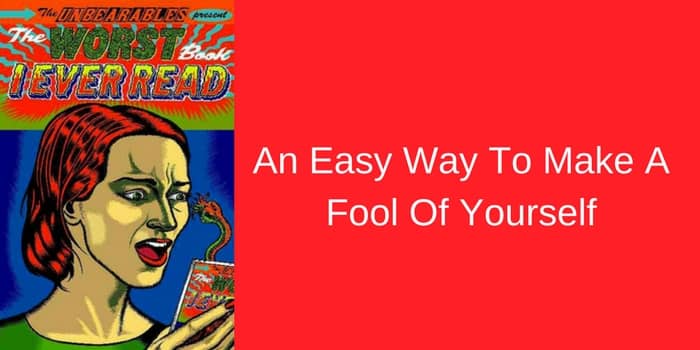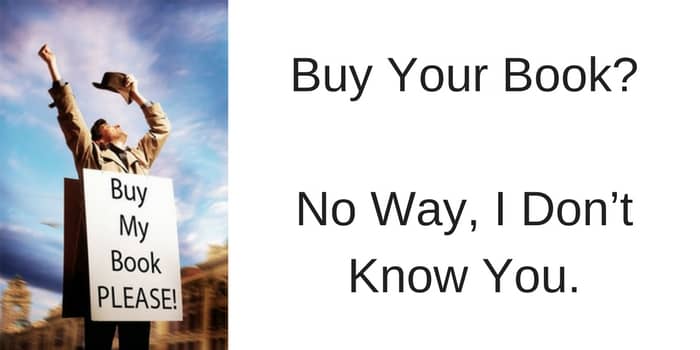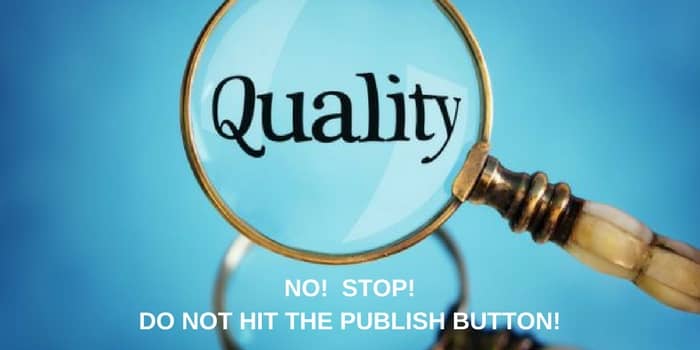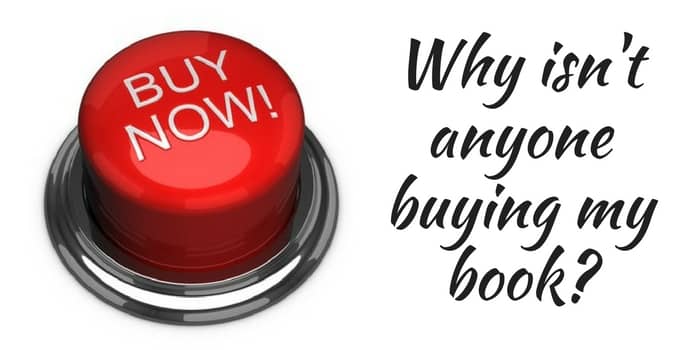
Don’t make a fool of yourself
Publishing a book has gone from exceedingly difficult, frustrating or expensive to just about free and an absolute cinch in almost the blink of an eye. The traditional agency model is under threat and vanity publishers are looking for where their next buck will come from as independent or self-publishing has suddenly become front and centre of the market.
No matter what you want to write about, you can jump from your book being just a word processor document on your laptop to a published ebook in less than 24 hours. How about in paperback in less than a week. Within six weeks you can have your book and/or ebook on sale in almost every country on the planet.
This is really just such wonderful news for those, who just a few short months ago were would be aspiring authors. Now there’s no need to a would be or aspire. Just push the button and you are instantly a published author.
Or a laughingstock.
The problem is that there is no definitive instruction manual for this new publishing process and certainly no quality control. A wonderful story can die a horrible death if the first page contains a spelling mistake. Or worse, mistakes. Typos like that/than is/it there/their just to name a few classics, bounce off the page at a reader and say, ‘close this book now’. A cover that looks like it was produced from a bad scan of a polaroid is another reader killer as is a badly written blurb or bio.
Then comes the difficulties involved in formatting a book for different book formats and ebook standards. It may look super in pdf, but a dog’s breakfast in epub. Readers like good typography. That’s what makes a book readable in either electronic or paper editions. If a book is uncomfortable for the reader’s eye, that’s the end of reading and enjoying your book.
Self-publishing with the dream that you will actually sell your book is just that. A dream. No one will buy it until they at least know about it. With millions upon millions of books available, how will yours get noticed? Then, even if you do get a prospective reader, if your Amazon sales rank is down in 4 millionth place, will they buy it?
Do you have a marketing plan? If the answer is no, don’t embarrass yourself and your great story. Wait. Go back to the drawing board and create a plan that is realistic and achievable. Or if you’re not sure, ask for some help.
So what’s my point here? Independent or self-publishing is a great innovation, but it is all too easy to publish absolute garbage. So many poorly prepared good stories (and very bad stories, including spam books) are now clogging up ebook stores. But this presents an author with an opportunity. If you want your book to stand out, take your time, get some advice if necessary and give your book its best chance to shine.
Because once you have made a fool of yourself, it is a tough assignment to get your credibility back.




Not if you change your ways. And your name.
I agree. It’s easy to create, but hard to stand out. And instead of laughingstock, it’s more likely to just be ignored.
Your /you’re is another common mistake – I can’t tell if you sarcastically left it in this post or not?
Thank you Shawn. Great things about blogs. There’s an edit button. Thank you for your/you’re very keen eye!
Hi Derek, we need more of such articles on the notorious rush to publish.
The only way out for such authors is to change the name; although to be fair, trash gets forgotten fast.
You know, it pains me so much to read the Amazon reviews for some (clearly not all!) self-pubbed authors. “Obviously self-published” is becoming a buzzword lately, it seems.
Even before creating the marketing plan, most self-pubbing authors ought to invest into at least three ruthless editors to have their manuscript torn to pieces and rebuilt. Just my humble opinion.
As a reviewer who sees quite a bit of indie and self-pubbed books, you are spot on in the editing department. If there are tons of typos, grammatical errors, and rough transitions, as a reader, I am so often pulled out of the story by these “BAD .. very bad” attention grabbers that it won’t matter if the story itself is good or not .. most often, I can’t even finish it for the eye-rolling.
If you are serious about being an author and selling your book, you make the effort and the investment of more than just the time spent writing. You get an editor. If you aren’t a graphic designer yourself, you hire one. Same with typography. I did and I’ve made back every penny and then some.
That said, you can just as easily make a fool of yourself with a blog, and I’m certain that observation was made when blogging took off. “Any idiot can write whatever he wants! The world is coming to an end!” (Note that’s not an observation on present company.) I’m not concerned about it, and I’m pretty sure that no one with a badly produced first effort will be ruined for life once they realize the misstep. You withdraw it, fix it, and re-release it–under a different title if it’s that bad. If writers were ruined every time they released a bad book, many of them would not be working today.
MeiLin, my thoughts exactly. (No, seriously, you covered all the points I was thinking in response to Derek’s article! Ha!)
These are exciting times. And dangerous times. In a lot of ways, it’s the easiest it has ever been to take your creative destiny in your own hands and succeed or fail based on your own merits. I wouldn’t miss it for the world!
So pleased to see people recognizing the importance of editing. While I agree that there is no “quality control” for this new indie/self-publishing world, indies can and should be diligent about creating books that set a standard of quality. Let’s not forget that there are some parts of the “old” publishing formula that just *work*–and should be replicated in this new “publishing process.” Like hiring a professional editor to edit your manuscript. Books in traditional publishing houses aren’t simply published exactly as the manuscript appeared when it first arrived. On the contrary, traditionally published manuscripts undergo rigorous editing, and so should the aspiring self-published author’s. A professional editor provides not only an eye toward correcting and addressing editorial errors and concerns, but many can also provide input on producing a saleable product. Yes, the term “aspiring author” may be a moniker you wear for only a short time (since you only need to “aspire” for as long as it takes you to produce your own book), but to be the author of a professional book you are proud of and that you can sell should still be the goal. Until the stigma of self-publishing is lifted, let’s stop fueling the fire by producing books with errors and mistakes. Listen to @MeiLin.
I applaud you @MeiLin, for what you did. Yours is a story that other authors need to hear. Your investment is giving you a return–likely with money, but with readers, esteem, and a positive reputation as well. Congrats to you. Thank you, @Derek, for this post. And @Austin, good for you for acknowledging the fact that authors need editors. I’m looking forward to continued conversation with you all.
.
Bravo! Each and every one of you have made a storng argument for seeking help instead of trying to go it alone for the sake of saying “you can buy my book here!” I for one wouldn’t trade my editor for any amount of money in the world.
Indie and self publishing have become a staple because they are so quick and easy. The thing is the strong writers will know that their work needs to be revised, edited and all of the requisite steps. Just as well, readers will find a way to sort through the weaker work to find the best. We are back into a time of choices for readers. It’s exciting but there is no easy ride.
Hi Derek!
First up, congrats on the migration to WordPress! Looks like you’ve already got most things sorted out, and your site is looking really nice.
What I fear most about how easy it is now to become a fully-fledged published author these days is that it won’t be all that long before the public’s expectations of quality will dramatically drop.
I know that quantity does not mean quality, but so many people have the "but everyone else is doing it" mentality. And from a consumer’s point of view, too many look at crap quality and think: "yeah, it’s crap, but everything else is just as bad so I’ll put up with it"
Luckily I’m not a sheep so I’ll continue to put effort into getting it right instead of just getting it done.
Kind regards,
Steve
Steve, there’s nothing to fear, really. They said the same things about penny-dreadfuls and comics.
For quality control, the public will turn to one another on places like Goodreads, and to those reviewers/curators who sort through what’s out there for the gems.
How will the reviewers get through it? By specializing. If you’re a “cozy mystery” fan, for instance, you’ll be able to rely on sites that specialize in those for pointers to good ones and warnings away from bad ones. I’m sure there are already specialized book communities that do this all together as a group rather than relying on a few reviewers buried under Mount Toberead. In fact, if I were entrepreneurial, which I’ve sworn off, I’d put together a few forums like that where tightly niched fans can get together–cozy mystery, military scifi, paranormal romance, erotic romance, etc, the more specific the niche the better–and talk about their finds both good and bad.
This is bad for me since my work is really hard to pigeonhole, to my real dismay. :)
Hi MeiLin!
You’re assuming that most people will seek advice on what they want to purchase/consume. Yes, some will, but only a insignificant minority. The vast majority will just follow what everyone else is consuming. In the end, whoever has the biggest, flashiest marketing dept will win the day.
For proof of what I’m saying, you need look no further than Microsoft. In a world that you describe they should not (in fact, could not) exist. Oh, how I wish I could live in such a world…
Kind regards,
Steve
…which is what happens right now, so, yeah, pretty much nothing’s gonna change except that writers will have better access to means of distribution. :) :)
You’re definitely a glass is half full kinda girl, I’ll give you that much. :-)
I hope you are right and that the inevitable deluge of crap doesn’t dilute the good stuff too much. :-)
Well, it’s a business and as any business, it needs professional approach. It does NOT mean finishing a draft, converting it in an e-reading format, attaching an image and publishing it.
I guess though, that professional writers know what is needed. Or at least I hope they do :D
Thank you for the interesting post :)
You make some excellent points that aren’t often said. Who talks about the typography of self-published books? How many authors even think about that.
If we want to achieve professional status, we have to act professional and produce quality products, even if that takes more effort.
Thanks for your thoughts.
It’s truly a great and helpful piece of info. I’m happy that you shared this useful info with us. Please keep us up to date like this. Thanks for sharing.
Geez, Derek, I feel for you, mate, I really do. You’re brand new to WordPress and you’re already getting spam comments.
Have you got Akismet installed/enabled? (WP spam protection plugin)
And then for scary fun, search google for: “It’s truly a great and helpful piece of info.”
BTW, mate, if you ever want/need any help with WordPress config, just yell (you know how to get hold of me). I won’t promise I’ll have the answer every time, but I’ll certainly do what I can.
Kind regards,
Steve
Yep, Akismet is on my to do list! Getting there slowly Steve. Thanks :)
Hi Derek I agree with every single word you said in this blog.
Typography and good formatting are so important and are all too sadly disregarded. As a poet I value the space around my words almost as much as the words themselves and it takes an expert to ensure my poems appear in an aesthetically pleasing way on an ebook in all proprietary formats.
My husband and I have set up a business to do all the things you mention except editing (but we know some brilliant editors we can recommend as well) – I haven’t linked from this comment to our business and I am not naming it in this comment because I hate spam and wouldn’t want to impose on your blog in that way.
But if you would direct message me on twitter I can give you the link if you’d like for you to check it is a relevant, appropriate one and then if you agreed I’d like to add it to these comments with your permission.
Thanks Michelle. I’m sure many of The Vandal readers who are in writers are weighed down with the demands of what it takes to self-publish professionally.
So no problems with adding a link to your blog via the ‘Commentluv’ facility within this commenting system. That’s what it’s for. We can all do with a little link or two :)
Thanks Derek.
Our business covers amongst other things:
Formatting and conversion for Amazon Kindle publication.
Typesetting ready for printing.
e-book conversion for Sony, Apple etc.
Special edition signed ebooks.
Cover design.
Preparation of Poetry for ebook or printed books by poetry formatting specialist.
Preparing book and cover files for printing.
As I said we can recommend editors if the author is not already edited professionally. We take the files from authors once they are are happy with the raw content and then do whatever is necessary to produce a book which will stand out against obviously self-pubbed and sit proudly next to titles from big publishers.
The business is called Really Love Your Book – making your book everything it should be.
We have many examples of books we’ve worked on for authors to check on our abilities to deliver what we promise and testimonials from happy authors.
@Michele,
I’d love to speak with you about your business. I am an editor and publishing consultant and it’s possible we’d have a lot to discuss! And @Derek, thanks for allowing this forum to be a place where people can speak freely about publishing.
I love everything about books and always have. But it wasn’t until I started working with them that I realized the many elements that actually compose a book. Writers have a job to do–and that’s write! They may not ever need to know words like “kerning” and “leading.” It’s very likely that they can write numerous bestsellers and never concern themselves with “running heads” and the “gutter.” I’m not saying that this new model of publishing excludes writers who want to publish themselves from doing a great job, I’m simply suggesting that it behooves authors to work with publishing professionals to ensure that their books are polished, professional, and publishable.
This is an exciting time. And the sense of community that exudes from indie and self-pubbed authors is unlike anything that’s ever been seen in the industry. I’m so glad to be a part of it!
Sage advice. It is odd how I’ve learned to expect a few spelling or formatting errors in ebooks, but never expect them from a print edition. It strikes me like telephone service. The traditional land lane service provided dial tone every time you picked up the phone. Cell phone service is still kind of sketchy, but the benefits seem to compensate for it.
I also draw a parallel to the indie music scene. Every desktop can become a recording studio, but if you don’t have a good song and a sense of how to get it to sound right with a good mix (same as editing), then people will stop listening after just a few bars. As writers we need to respect our readers as much as we respect our craft. As you say, that means taking the time to do it correctly. I thought I had my book just right and gave it to an editor before I did the submission. She found 40 corrections that I totally missed because I was too close to the project.
Thanks, again.
Well… I agree to your text… Sort of. I am a self-published author and I simply LOVE writing and marketing my own books. I write because I enjoy it. Sure, self-publishing authors are doing a lot of things wrong – but they are having fun, they are being creative! Same is true for my books, and for some weird reason, my readers seem to forgive me, as my books sell. Remember, nobody forces the “poor” readers out there to buy and read our self-published books… Just ignore the bad ones. The hype of self-publishing will die down again, as soon as the money focused authors discover that the book business is not a “get rich fast scheme” – it never was and never will be.
I agree that bad proofreading can kill an otherwise great book. I recently slogged through a book that was rife with punctuation errors. Every page had close quotes without opening quotation marks. Or periods in the middle of a sentence. If the plot and character weren’t so good I would have tossed it in that box in the corner labeled ‘garage sale’. If I were that author, I would have been too embarrassed to sell that book.
When I am getting ready to publish, I several readers. Inevitably even the third reader finds thing the other two missed. When I read my own work, I see what should be there rather than what is really on the page. That’s why I tell my students to proofread each other’s work.
I agree with your analysis of the current state of publishing. The kicker is that new writers seldom have the resources or knowledge to find the right team to help them polish their work so that the finished product approaches the quality of what people are used to seeing on the shelves at brick and mortar stores. The development of teams who can help self-publishing authors get from “The End” to the beginning of a successful career is something that really needs to happen.
Hi Stephen!
I see this as being pretty much a non-issue. Why? Because everything is already right at your fingertips. Use the search engines, get on the social networks and hang out with the authors. Amazon is a great resource. You can learn a lot by poking about in there. :-)
Correct me if I’m wrong about this, Derek, but the hardest parts about being a successful indie author are: writing the story, and promoting it after it is available for sale. Getting it published is the easy bit. :-)
Caveat: I’m not a published auther (don’t even play one on TV)
Kind regards,
Steve
Steve and Stephen, a good homonym hook up here.
Yes, writing the book and the selling it are the two big obvious tasks, but having your book proofread and edited professionally, which really makes a book a readable and saleable product, is not a cheap process. For indie writers the best solution is usually ‘find a friend’.
But there are more and more editing and formatting services being offered for indies, however you need to be very careful as not all of them have the necessary skills.
Thank for the forum, Derek. I agree with a lot of positive things that have been said. To be a self published author is so easy it does make many look like fools. All the issues concerning formatting, typography and converting to ebooks can be learned– even by old guys like me. It’s not easy and using books like CMS- Chicago Manual of Style- and others aren’t easy. But to do it right– unless you have lots of money– is a must to set some sort of standards.
The one thing that I believe is a must is editing. For those authors out there who think they can edit their own work– Try submitting something you’ve done to a proof reader/editor and see what comes back. It takes guts to give your work to someone who will rip and tear and in the end make it so much better.
Wouldn’t it be nice if there was a group or seal that you could put on you books to show it meets certain standards and people who read self published works could rely on that? It still wouldn’t mean it was a good story but at least you could read it and weed through some of the trash that is out there today. Probably too much to ask for.
I think @MeiLin said it the best. Writing is easy. Producing a book is difficult to do. We authors need help and should use people you will grow to love– editors.
“Or if your not sure, ask for some help.” ???
Yeah, I noticed that too.
I do a far better job self-editing than I did four years ago, before hiring my two editors.
But one of them ALWAYS does the final editing. Paying for editing was one of the first expenses I took on in getting my books out there, and it is one that I will always have. :)
Formatting isn’t difficult, if you can follow instructions and there are clear instructions that result in a good finished file. But, like editing, your eyeballs get tired and so having someone else do it, if possible, is a good thing. Paying someone to format my ebooks is now one of my production expenses.
The last thing is cover design, and at some point in the future, I’ll be paying someone else to design those and adding one more thing to my production expenses.
And every penny of those expenses is worth it. I consider them investments, because I want my stories to be presented in as professional a manner as possible.
As has been often said, you have to spend money to make it. If you won’t invest in your own work, why should anyone bother buying it? :)
Whoops, I skipped a step. Beta readers – I have them. They start reading once I have about 1/3 to 1/2 the book written, and point out holes, inconsistencies, etc., so that I have plenty of time to revise and repair. :)
Not having tried the e-book thing, I appreciate the guidance. I have a non-fiction book manuscript completed. I’m not so much concerned about making a fool of myself (that mission has been accomplished!) , but would like to see the book connect with readers. Thanks for the article and everyone’s comments.
You withdraw it, fix it, and re-release it–under a different title if it’s that bad. Formatting isn’t difficult, if you can follow instructions and there are clear instructions that result in a good finished file. I wouldn’t miss it for the world! Probably too much to ask for.
The traditional press and magazines used to say the same thing about blogs. There is irony to be enjoyed here. :)